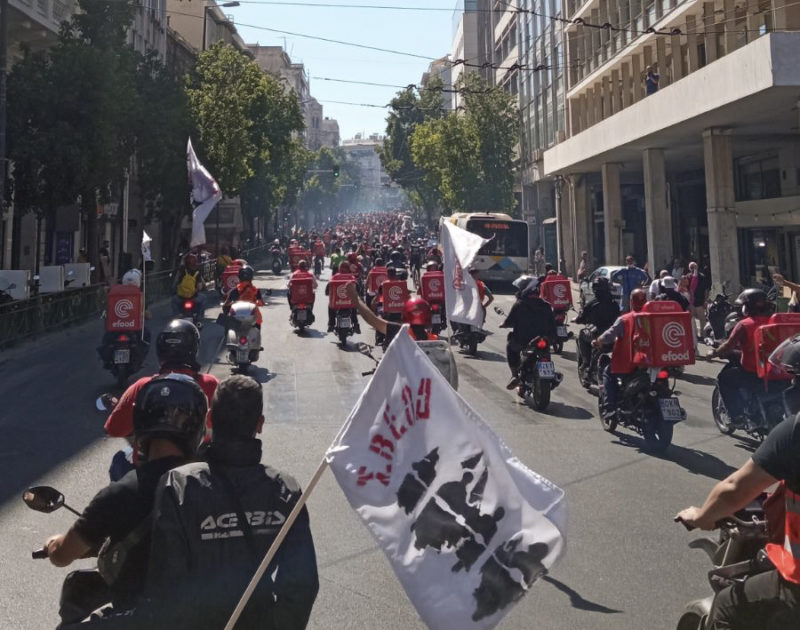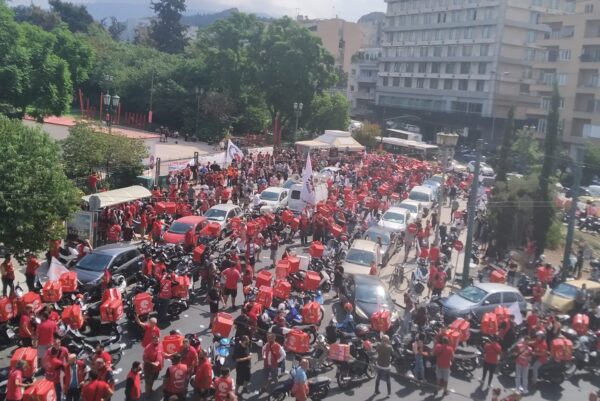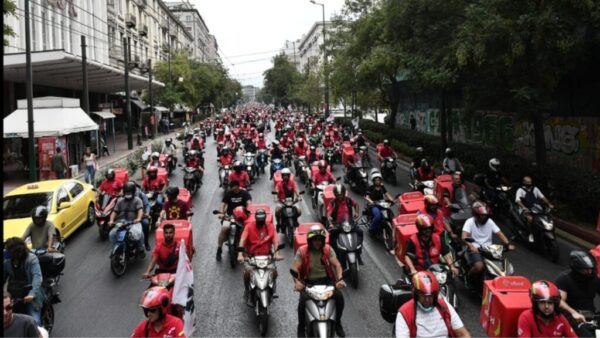INTRODUCTION – BACKGROUND
On the 15th of September (2021) the company “e-food”, a platform operating in the field of food delivery, sent a message to 115 of its workers whose fixed-term contracts with the slaver company MANPOWER were about to end on the 31st of the same month. In a cynical and threatening manner, the message informed the workers that the contracts will not be extended, and that the only choice they have is to become freelance workers. The “choice” is presented by the company as an appealing working experience which everybody in the company deserves to try. From the first moment the message was sent, many colleagues felt the stress and the uncertainty about their future in the company growing large. Social media went on fire, and discussions started to flare up all over. As a result, the first round ended quickly. The company doubled back, after the uproar it generated, and released a media statement referring to some kind of “communication error”. This was followed by the organized reaction of the workers and a huge participation in the assemblies at a national level. Collective decisions calling for action were quickly taken, all of which created a fighting spirit of cooperation between the colleagues, with unprecedented features, for both the specific field of work and the working class in general.
THE SOCIAL REACTION - THE STRUGGLES OF THE UNION AS A VEHICLE OF CONNECTION
As soon as the message became known amongst all the riders (as the company likes to call the colleagues on social media) a wide and chaotic range of reactions occurred, going as far as the #cancel e-food campaign, resulting in customers removing the delivery app from their phones by the thousands. This effort involved simple customers but also restaurants, the business partners of the platform itself, all of which contributed to effectively amplify the ongoing reactions of society. In the second statement the company made a U-turn referring to a “communication error that doesn’t touch in the slightest way the core of the working reality with e-food which is, and will remain, anthropocentric”. The problem for the company however was that this tactic of withdrawal did not convince anybody, least of all the workers themselves. On the contrary it infuriated, and finally united even more, the colleagues who understood perfectly how the statement was a mockery, practically considering us all fools.
At the same time, the reaction that workers/citizens/customers displayed on the internet, together with the digital breakdown of the e-food platform, created a new narrative for solidarity and resistance in cyberspace, which in this context acted as a supporting factor to the years-long struggles of our union to communicate in the workplaces, in the squares, with every colleague individually. The weekly tactical assemblies resulted in an osmosis and fermentationwhich yet again bore fruits. The militancy of our members, the belief that the struggle is capable of changing things, the 14-years long, constant dialogue with our class and the society in which we grew, all constitute the vessel - the soil on which these social reactions bore fruits. It was our own voice that became the major class narrative which acted as a catalyst for the development of the struggle. There’s no doubt for us that without this union/vessel, at one point these reactions would have lost their momentum. They would have started to retreat in the face of the communication tools of the systemic media, which in return for payment would have enforced the bosses’ narrative.
THE STRUGGLE OF THE COLLEAGUES OF E-FOOD, CATALYST ON THE ROAD TO VICTORY
The magnificent motorbike demos that happened throughout Greece on Wednesday 22/9 together with the 4-hour strike, forced the multinational platform company to retreat. In the afternoon of Thursday 23 September (just a few hours before the strike) it announced both that all fixed-term contracts will be converted into open-ended / permanent contracts, and the termination of their collaboration with the slaver company MANPOWER GROUP.
The colleagues were undoubtedly the main catalyst, the basic regulating factor of the developments that led us to the victory. Their massive participation in the assemblies established a path of militancy and common action. It was they who did not “take the bait” of the dilemma “freelancer or unemployed”. Besides the refusal of the explicit blackmail (the essential non-choice) that e-food “proposed”, it turns out that amongst the vast majority of colleagues, the belief that it is not worth it to work without rights has strongly consolidated. Whether it is called freelancer, partner, self-employed or independent professional. Furthermore, an important role was played by the high syndicalist unity and class composition in the profession (compared with other professions and sectors). The constant communication with the social base, the continuous fermentation, and the analysis. The exemplary coordination, our fast (and yet, not rushed) actions and decisions, surely leave their own legacy to the worker’s movement. We also recognize how a determinant role in the victory was played by the exceptionally strong support of society, of the workers from hundreds of professions and sectors who saw themselves in the struggle of the union for permanent contracts, full working and insurance rights.
THE COMPANY’S STANCE
The stance of e-food was, from the beginning, a classic employer combination of down-playing, lies and hypocrisy. With the same ease with which they initially appeared as arrogant and inhuman, on Thursday 23/9 they presented themselves as sympathetic towards the workers and anthropocentric. Their duplicity does not impress us. After all, we are talking about the same company that presented us with the dilemma “freelancer or unemployed.” Which, in order to justify the lay-offs, called the 115 workers who received the letter “lazy”, while simultaneously asking them to become “partners.” Which invested in social cannibalism, leaking out propaganda through their paid parrots on how as freelancers, the workers would have worked more and avoided acquiring the “public employee mentality”. We are talking about the very same company that on Wednesday 22/9 welcomed us with police vans, and took care to inform us that it had no intention of negotiating in the presence of thousands of striking workers outside the entrance of its offices. That told us very clearly it wouldn’t accept the connection between the negotiation and the pressure that the collective struggles of workers are able to exercise. The “anthropocentric” e-food didn’t hesitate, even in the face of inevitable defeat, to bargain “under the table” - trying to negotiate the number of contracts that would have been converted into open-ended contracts. And when it saw, under the pressure of our rightful demands, its digital infrastructure on the verge of collapse, it tried - for obvious communicational reasons - to save the little reputation it had left. In anticipation of the strike, it announced the conversion of the contracts of 2.016 workers into open-ended / permanent contracts. The company’s announcement, besides its immediate survival, has two other goals. The first is the renovation of its deconstructed image. To make it appear to be pro-workers, engaging in dialogue with society, listening to everybody. And for this reason they proceeded to communicate the following sophisticated and sentimentally curated statement:
“The last few days many people have talked about us without knowing the e-food family. We listened to everybody. The worker’s unions and their demands. The dialogue of the political parties. The people on social media and their correspondence with us. The journalists. And especially our workers, who know our way of working and our day-to-day life. We did what we consider our duty, because we are an anthropocentric company.”
The second but equally important goal has to do with the effort of delegitimization in order to remove the class syndicalism from the picture of the victory. In order to keep us from becoming accepted as equal participants in the process of the struggle. However, the same struggle showed the fluidity of the term “negotiation”, since both workers and society managed to impose their own terms onto the company and forced it to sit at the table with the multi-faceted synergy of the struggle. The company did not succeed in its goals. Despite their constant cry for the “communication error” and sophisticated attempts to bypass syndicalism, e-food drove itself into a dead end, completely accepting our demands and totally withdrawing as it saw its app crumbling, dragging its profits along.
INTRACAPITALIST COMPETITION
Every specific conjuncture is always the product of complex processes. In this context, a new company appeared, promoting itself as the company of permanent contract relations - with the purpose of striking a timely blow to its adversary and gaining back, with some kind of “checkmate” move, an important portion of the market. Even if the move of the competing company, using the permanent contracts to promote itself, provessooner or later to be a trick or a straight up lie - in the present moment, at the peak of the class conflict, it acquired crucial importance since it stressed and pressed the competitor up against the bars of their own dead ends. From the beginning we formed the notion that this is a software competition not an actual productivity one, since the companies neither have an infrastructure nor a real substance in the production world, which makes them vulnerable to convert at any time to a “past” trend.
The companies that offer digital intermediation services like e-food, produce nothing. We are talking about apps, calculations and algorithms. The profit is produced by the delivery workers that risk their lives in the streets on a daily basis. Unfortunately for the company, as for any other giant with feet of clay, the simple “click” on the keyboard doesn’t prepare, doesn’t wrap, doesn’t move the order from one place to another. This is done by us, the workers, and this specific fact is what maximizes our collective bargaining strength, is what makes us invulnerable when we answer to the challenges united, committed to our own class interests.
CLEAR, WELL-DEFINED POSITIONS AND THEIR REFLECTION ON THE WORKING CLASS
As our weapon we have the constant fermentation and communication with the base of the colleagues and the preliminary work that has been done by the union in relation to the platforms and the gig economy, we have clear and well-defined positions and demands. The foremost of these: a) permanent working contracts with full salary and insurance rights, b) abolition of the arbitrary ranking system. The agenda is framed by old and constant but also new demands which will soon constitute the content of the Collective Working Contract. They concern: accommodation and protection of the delivery workers from bad weather conditions, the demarcation of working areas, company cell-phones, personal protective equipment provided by the company, rational compensation for gas, detailed description of the whole sum of problems related to daily working activity. The double demand for permanent working contracts and the abolition of the ranking systems was put forward directly by the union and became common sense for the vast majority of the colleagues. Moreover, it was adopted by a huge part of the society and the working class, who recognized themselves in our situation. The dynamics developed helped the movement and strengthened the struggle. During all this movement we think our presence was absolutely clear, sincere, and understood. We never underestimated nor insulted those who stood against our struggle, our colleagues, our class. We remained unfazed and indicated in all directions how the survival of the company passes by necessity through the acceptance of the rightful and deeply social demands of the union. Otherwise, we pointed out how the place of the company will be substituted by the void. And it is well-known how nature (as well as capitalism’s nature) dislikes empty spaces, and quickly rushes to fill them up.
DOMINANT NARRATIVES – FREELANCING
- a) The struggles for permanent contracts will lower the profits of the platform and the company will have to leave the country
As a union we believe that the deconstruction of this narrative starts from a simple question. Do we want to live or to survive? We raise this rhetorical question to state in the simplest way that we want working relations that grant us decent working conditions and salary, and free time for us and our families. It’s really that simple. And since nothing has ever been given to us for free, we demand what our class has shed its blood for. We want the technological progress that has been achieved to have a positive reflection in our lives. That the predatory profits which companies have accumulated by stealing from us, not to be the criterion by which progress is measured. We don’t want to count deaths, while the companies count annual indexes and algorithms. And to conclude our thought, we’ll pose one more rhetorical question. If the propositions of a profitable company are lay-offs and the transfer of costs onto the backs of the workers - then a less profitable company, what kind of working relations will propose to the workers?
- b) Syndicalism is outdated
One of the dominant narratives of the last decades, mostly in the system’s media, presents syndicalism as one of the most important if not the main enemy of economic development, and thus… of society in general. At the same time, the paid microphones, “subsidized” by the state with tens of millions of euros, get “outraged” by the public sector syndicalists - also paid by the state. The clientelist relations, the privileges, and the entrapment of society by a handful of parasites that close the streets every so often. With the responsibility of a great number of the workers themselves, who entrust their struggles and their fate to clientelist/governmental/political party/state-fed mechanisms, the “rage” of the paid journalists of the systemic media gains an audience. An audience with selective memory, comfortable in forgetting that the syndicalist practices which they berate are a consequence of the dominant party mechanisms which they themselves vote for and support. Which means, of their own.
As syndicalists that participate in a base union, we stand at the opposite side of this narrative. We are blood of the same blood of the society that struggles, tile and pillar of class syndicalism, product of the sacrifices of our class, which guides us and from which we draw inspiration. Constant aim of ours, to become the projection in the present of the historic struggle. So yes, we are dangerous for their narrative about development. The development that has its roots in poverty and the loss of acquired rights. Because base syndicalism, our own class narrative, doesn’t receive funds “under the table”, doesn’t make secret agreements, doesn’t have paid members, doesn’t get subsidized by the state and doesn’t get bought out for seats in public office of the municipal or national governments. We are the syndicalism of the workers that don’t want to bow their heads, that don’t settle for the breadcrumbs that the dominant political system throws at us. Unfortunately for all of those that stand against us, we have unity and class conscience, words that through our struggles will emerge again from the temporary oblivion. We are the society that doesn’t compromise, that fights for a better present and for a better future. During the strike of Tuesday (when the company essentially wanted to prevent dialogue) the colleagues that voted for the strike by raising their hands in real time, delegitimized the Chatzidaki law in practice. A deep, touching, strong moment that filled us with class pride. An image from the future that we have in store for every article, every anti-labour regulation of the Chatzidaki law. It makes it clear, towards every direction, that there is a healthy tendency inside the class and the society. A uniting tendency in the positions and actions which create legacies and strengthen consciences.
- c) Freelance work
In our field, freelance work hides a dependent work relation since it refers to workers that in every case are covered (until the approval of the Chatzidaki law) by the existing labour legislation. The companies that operate in the gig economy, the companies of digital mediation of the fourth industrial revolution, have launched a communicational attack which aims to convince us that the delivery workers of the platforms are not the same as the delivery workers of the grills, the restaurants, or other similar businesses.
The principal argument (unfounded and until recently without strong and composed reply) they put forward is that the pickup/delivery orders which are given through the algorithm of e-food, Wolt, or any other digital platforms on the phone, create the preconditions of a working relation that doesn’t concern permanent working contracts.
So if the orders for picking up and delivering the products are given by a boss or a superior verbally, in writing or over the phone, the worker is to be considered a wage-worker with a working relation that allows for a permanent contract, but when the orders are given by the “platform” the worker is transformed into a “partner”?
Against any logic, the digital mediation companies and their lobbies, capitalism in its new suit named gig economy and its parrots, strive to persuade us that when the pickup/delivery orders are given by a platform like e-food or Wolt, then the wage-worker transforms into freelancer, partner, self-employed or private contractor.
The line of argument by the companies of digital mediation is absurd, inconsistent and false, and its purpose is to shift the labour law from the obvious to the vague and uncertain. From the historically imposed to the uninformed. Furthermore, freelance work is neither emancipatory nor revolutionary for the workers. The pretexts of the “right to choose” when to work and the high income have been shown to be based upon:
- the constant direct and indirect exhortations by the digital mediation companies to work during the peak hours
- for the most hours possible
- in order to get a higher income.
However it is not a net income that goes directly in your pocket, since the workers have to take out from this income all the expenses that are being transferred onto their own backs, such as: purchase and maintenance of the moto/bike, gas expenses, purchase of the working phone and other supporting gadgets, and the rights to paid vacation, sick leave, pregnancy and parental leave, wedding/Easter/Christmas/holiday bonuses, medical and economic coverage in the event of an accident, unemployment benefits, all manner of extra benefits, and taxation which increases according to yearly income.
We also have to point out that no kind of “freedom” regulates the systems of constant and arbitrary ranking that impose the rhythm of the working activity and which at any moment may “dismiss the partnership” and throw you out like a squeezed lemon-cup.
As a union, we are against the false narratives of the bosses that aim at the full destruction, the absolute flexibilisation of the modern working reality. There is no real reason for imposing the new legislative arrangement of our work in delivery for the platforms since the content, the manner, the nature of the work, all remain the same. Either with the direct verbal or written order by the boss as in the past, or through an app on the phone like today, it is us the workers that deliver the products.
The deliveries are neither carried wirelessly nor with a keyboard on a pc. They were always carried, they are carried and will be carried by us the workers. The work remains the same and the adoption of the term gig economy has the purpose of creating a false reality, an empty theatrical stage which aims at imposing, on a communicational level, without reactions and with the compliant opinion of the society, the change of the legislation. To change the legislation towards the worst and exempt the companies from their obligations towards the workers without it being required by any reality, when the nature of the work didn’t, in fact, change at all.
To which social sectors is this false narrative by the digital mediation companies investing?
For many, freelance work constitutes a necessary choice, a second solution to make up for a mutilated income and make a living for a family.
It is the imposed “free” choice of a student/immigrant/unemployed in order to have some kind of income, in a state and in an economy that wants him/her/them cheap, available at any moment and without rights.
It is the imposed “freedom” of those who choose freelance work as their main occupation, of those who are often forced to work beyond the eight hours to meet their economic needs, and who, because of exhaustion, are at even greater risk as they expose themselves many times over to the dangers of the streets.
It is the imposed “freedom” which abroad, as the offer for work increases, then the payment per delivery decreases accordingly (work by the piece / freelance.) It is the practice of auctioning for deliveries that constantly decreases the payments and creates a dystopic future with cannibalistic features.
Colleagues, it is 14 years now that our union fights, analyses and organizes the struggles. It is supported by the values and the principles of base syndicalism and serves the profession and the class with consistency, coherence, and focused dedication to our goals. It is supported by the militancy of its members and the more its ranks grow, the more pressure we are able to exercise in aid of our profession and our class. The justness of the struggle fills us with strength and courage. Let’s destroy the castle of defeatism, stone after stone, until there’s nothing left.
It is worthwhile to struggle. It is worth it because only then you can hope to WIN.
VICTORY – VICTORY – VICTORY.





